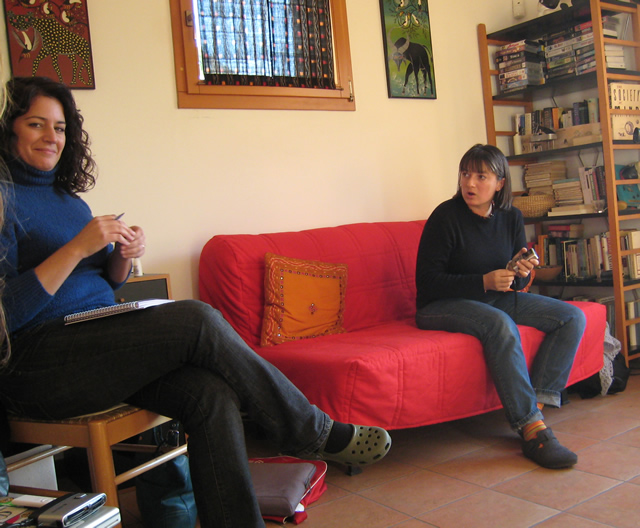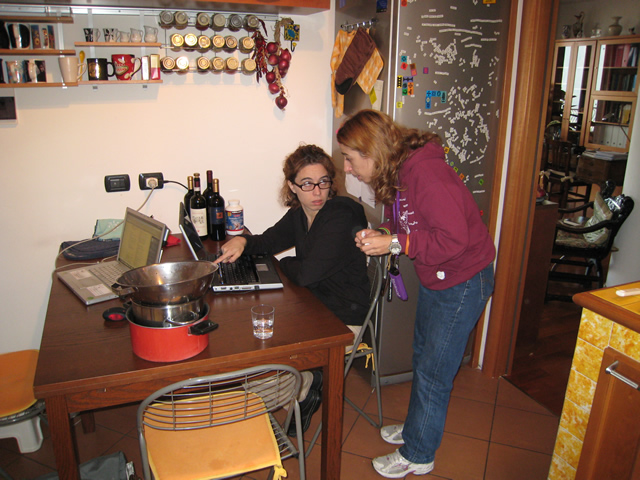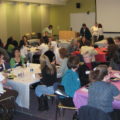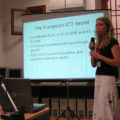^ top: the finer points of CSS – Tara and Elena in my kitchen
Increasingly frustrated with the low visibility of women in technology in Italy, back in June I and a few like-minded ladies hatched a plan to start doing something about it.
The first step was to get together. So I invited them all up for a weekend at our house (sent Enrico off to visit his mother – yes, he is a supportive husband!).
Turnout was not as large as I had hoped (the house could have slept 14 or so), but those who came were motivated – most had to be, to trek all the way out here.
Friday night it was just me, Tara, and Elena. It had been a long week for us all, so we ate dinner, watched a movie, and went to bed.
The next morning I woke up early (as usual) and got to work cooking (while my computer was compressing video for Sun). Tara and Elena eventually wandered in and set up their laptops on the kitchen table, working separately and together on this and that. It was oddly comforting to have them there while I cooked (usually a lonely activity for me); I’d like to have girl geeks in my kitchen more often!
The crew gradually assembled and introduced themselves:
- Tara Kelly, founding partner of PassPack
- Elena Franco, aka Delymyth, sysadmin
- Silvia Cavallon, a former colleague of mine from Incat days, now a tech support manager for HP
- Sara Rosso, Internet Services Manager at Ogilvy Interactive
- Sara Maternini, corporate blogger and event manager for San Lorenzo, who kindly furnished us with a six-pack of Franciacorta (Italian champagne-method wine)
- Celia Abernethy, web designer/builder/programmer and owner of MilanoStyle
- Susan Quercioli, a manager of technical projects and people
- me
Talk flowed, mostly informally, but that doesn’t mean we weren’t sharing useful information.
There were the expected horror stories:
- Every woman in Italy knows that being married and in età fertile (of childbearing age) is an enormous handicap in finding a job. It is perfectly legal for a prospective employer to ask your age and marital status (indeed, many job announcements specify the age range they will consider). Italy’s generous maternity leave law has backfired: no one wants to hire a woman who may go out to have a baby, costing the company money. And there are no real protections against discrimination of any sort in the Italian job market.
- As in many other countries, women in Italy are paid less than men for the same work (and all Italian salaries are low against European averages, especially considering the cost of living here). One of the group, upon requesting a raise, was asked: “Doesn’t your husband earn enough to support you?” As if her work was just a hobby! The reality is that most women in Italy who work do so because their families need their income as much as their husbands’, so, yes, we need (as well as deserve) equal salaries.
- We see our male colleagues getting jobs, raises, and promotions based on their skills at self-promotion as much as or more than for their actual abilities or work accomplishments – and getting paid more for doing less than we do!
- And on, and on…
So, yes, there is plenty for women in IT in Italy to be unhappy about. But we didn’t get together just to bitch. The point of the weekend was to discuss what we can do to help ourselves, each other, and the larger community of girl geeks in Italy.
Under Sara Rosso‘s (welcome) leadership, each of us described what we hoped to get out of this event. These included:
- “How should I write my curriculum to reflect my real-world experience, especially since I don’t have the formal qualifications that companies think they need?”
- “I’m a female manager in a male world, and I think I can see better, let’s call them more ‘feminine’, ways of managing people. But in my job I don’t have any role models I can look to for advice or examples. I’d like to have someone to talk to about my ideas.”
- “I’ve been badly underpaid in my career, partly because I find it hard to negotiate, partly because I don’t know the Italian market value of my skills. Where can I get information on salaries and freelance rates, and advice or training in how to negotiate?”
- “I wanted to change jobs, but I didn’t know enough about possible Italian employers to tell which companies I might actually like to work for.”
- “It’s great to know that I’m not the only woman in high tech in Italy, and not the only one to deal with these issues. When can we meet again?”

^ Sara Rosso and Susan Quercioli [Susie Q?]
Sunday morning the first-round attendees left, to be quickly replaced by:
- Enrica Garzilli, Sanskritist and journalist
- Ruhama Zayit, software engineer at TVBLOB
- Bruna Gardella, Senior Analyst at Etnoteam Spa
More useful experiences and information were shared (as well as an Indian lunch that I cooked).
At the end of the two days, we had some next steps:
- Set up an online community where we can discuss and plan. For the time being, this is a Yahoo group.
- Though we did not explicitly say so, one of the aims would naturally be to get more women to join this community – if you want to join, head on over and ask!
Possible projects for the community:
- Periodic social events – aperitivi, Girl Geek dinners. A monthly aperitivo in Milan will probably start in November (2nd Tuesdays), organized by Lisa Morris of TVBLOB. And we’re discussing a date and a speaker for the next Girl Geeks Dinner.
- Practical workshops where we can learn skills we feel we are lacking. One specific suggestion was negotiation – ideally, with role-playing to help us learn how to do it. We need to share info on where we might find people to do such workshops and how we would finance them (e.g., a good friend of mine is the Italy coordinator for the Open University, which might be interested in doing something relevant).
- Job bank? At the very least, we can start sharing information on jobs we’re aware of via the Yahoo group.
- Salary bank, with a wide range of both men’s and women’s salaries and freelance rates (in Italy), to help us see how we’re doing and price future jobs and freelance work. Bruna told us that Il Sole 24 Ore already runs quantomipagano.com, which looks very useful but does not cover freelance or contratto a progetto rates. Perhaps we can persuade Il Sole that it’s in everybody’s interest for them to expand their database to include this info. Who has a contact there?
- Events calendar. Sometimes we don’t go to technical conferences or barcamps because we feel overwhelmed by the vast majority of men there. A shared calendar will let us track events we might be interested in, and encourage each other to go.
- Speaker lists. Another reason we don’t go to events is because we’re not represented among the speakers – we get tired of being talked at by men. We can develop and maintain a list of women qualified, willing, and able to speak on various technical topics, and, um, gently suggest them when we know about events being organized.
- Many of us don’t have women technical colleagues we can talk to at work, so we would like to both give and receive mentoring (on specific questions or for general support and advice).
Having this nascent supportive community of women in IT is already proving useful. Had I met Bruna a year ago and talked with her about some Italian IT companies she’s familiar with, I might not have been so much in despair about my job prospects in Italy. Celia said that, had she known us three years ago, she might not have abandoned the web business she enjoyed (and in fact she’s now thinking about getting back into it!).
Your thoughts and contributions welcome!












